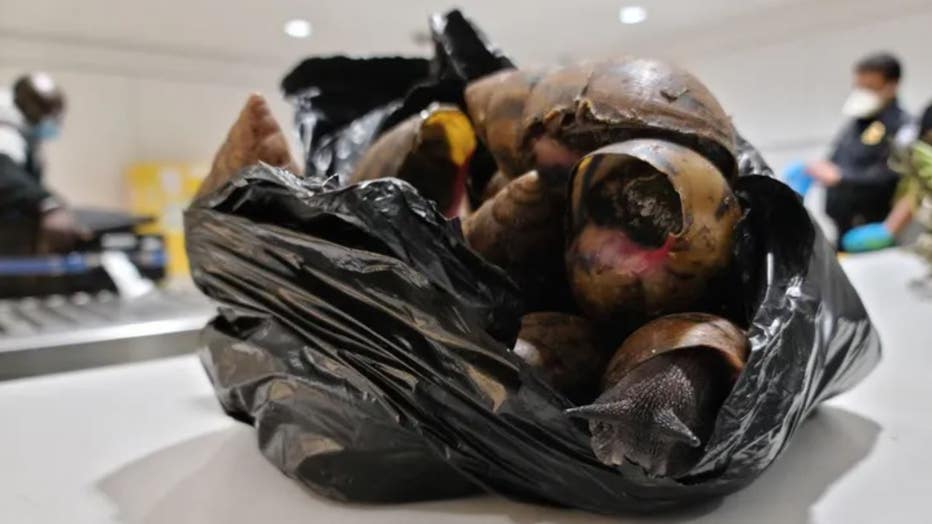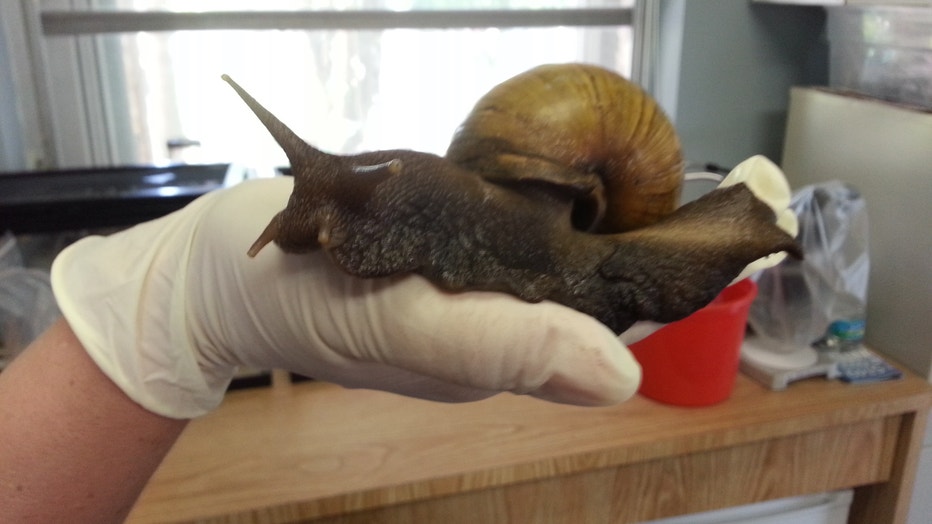1,000 Giant African land snails found in Pasco County, officials say
NEW PORT RICHEY, Fla. - The Giant African land snail is one of the most damaging snails in the world, and the invasive species has one part of Pasco County under quarantine. Thursday, state officials said 30 people are working to locate and remove the snails.
"So far today," said Dr. Greg Hodges, the assistant director of the state's Division of Plant Industry, "we have collected a little more than 1,000 snails in our core area."
When Giant African land snails were discovered in New Port Richey just a few weeks ago, officials were concerned. Since then, the invasive snails have been found on 29 properties within the quarantined area.
Dr. Hodges promised residents the state will be successful, but it will take time. He said he believes the snails have been in the area for about a year.

The snail is popular in the pet trade in other countries, but it is a federally prohibited organism that cannot be legally sold or possessed in the United States, per the FDACS report. (U. S. Customs and Border Protection)
How can officials eradicate the Giant African land snail?
Since finding the snails, the Florida Department of Agriculture and Consumer Services has been out to the area several times to spray it with snail bait – described as a metaldehyde-based molluscicide labeled by the U.S. Environmental Protection Agency for residential use. It is a pesticide used to control snails that’s approved for use in many crops, fruit trees, avocado and citrus orchards, berry plants, banana plants, and in limited residential areas, officials said.
The pesticide interferes with the snail’s mucus production ability, thereby reducing their digestion and mobility, which makes them susceptible to dehydration, per the website.
After eating the metaldehyde, the snail often seeks hiding places, then becomes inactive and begins to die within days, the department said.
MORE: Pasco County residents say more invasive snails spotted in quarantined area
They are removed and euthanized, Dr. Hodges explained. The snails are transported to the University of Florida for researchers to compare this population to previous ones that were eradicated in the state.
According to the Florida Department of Agriculture and Consumer Services (FDACS), the recent snail sighting was first confirmed by a Pasco County Master Gardener, who found the almost 8-inch-long snail in the New Port Richey area – specifically in an area near Massachusetts Avenue and Rowan Road. The confirmation of the return of the Giant African land snail came on June 23.
After, that area was quarantined, meaning residents are not able to move any soil, plants, or yard waste from that area.
"The good thing is they move pretty slow," Dr. Hodges said. "They need human help to move to new areas."
What are Giant African land snails?
The snails are quite popular in pet trades.
"I think the biggest thing is…the snail is quite attractive. What I would tell anybody is please research anything you are going to purchase as a pet," Dr. Hodges said, adding that it’s illegal to have it in the state. "Prevent it by keeping it out."
The Giant African land snails can cause significant damage to tropical environments and pose a serious health risk to humans by carrying the parasite rat lungworm known to cause meningitis. It consumes at least 500 types of plants, causes structural damage to plaster and stucco structures, and carries a parasitic nematode that can lead to meningitis in humans.
The snails remain a threat in Hawaii and the Caribbean after their eradication in Florida in 2021. Each snail has both female and male reproductive organs, so they can reproduce rapidly. It is able to reproduce several more times after mating once.
They can have about 1,200 eggs every year. They are also one of the world's largest land snails.
The state first eradicated the pest in 1975 after detecting it in 1969 and most recently eradicated the pest in 2021 after detecting it in 2011 in Miami-Dade County, according to the USDA.
"The phenotype in Pasco County has a creamy white flesh as opposed to the grey-ish brown flesh of the phenotype that was eradicated in the Miami area," said Erin M. Moffet, FDACS’s communications director.

One business owner who spoke to FOX 13 said his business falls within that quarantine zone – and on any given day he could see up to 30 of the land snails.
"They eat stucco and paint, which I was totally taken back. I started looking all over my building like, I can't believe a snail would do that," said Jay Pasqua, who owns East Richey Lawn Mower & Equipment. "And no sooner that happened the next day, I found half a dozen snails. Right. I saw on the other side of the fence and one of them actually they measured was six inches long."
READ: Invasive snail that loves damaging plants, living in humidity found in Pasco County
The Giant African land snails are a cause for concern as experts say They can cause extensive damage to vegetation, and they also carry a parasite called rat lungworm, which is known to cause meningitis in humans.
"Please if you see one of these snails do not touch it. Call us. Make sure you have experts," said Agriculture Commissioner Nikki Fried. "They carry diseases like meningitis. Do not eat them. This is not a snail you put on butter and toast."
RELATED: Largest Burmese python ever captured in Florida weighs 215 pounds with over 100 developing eggs
FDACS asks residents to report them by calling the agency's hotline at 1-888-397-1517.

